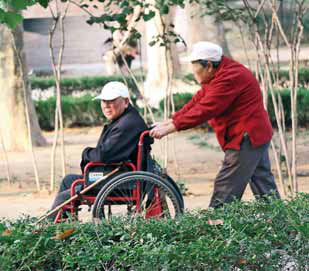Prevention of diseases requires improvement
Updated: 2012-06-06 07:11
By Liu Zhihua (China Daily)
|
||||||||
|
The prevalence of cardiovascular diseases among the aging population has become a heavy burden. Huang Jiexian / Asia News Photo |
China is not well prepared to combat stroke and heart-related diseases of the aging population, say experts at a recent forum organized by Beijing Hospital and Beijing Medical Association.
According to the Ministry of Health, China has more than 230 million people with cardiovascular and cerebrovascular diseases, which involve disorders of the heart, brain and blood vessels.
These illnesses have a significantly higher death rate compared to other diseases, with fatalities of nearly 3 million annually.
"China is not making enough efforts at both the primary and secondary prevention stages," notes Yang Jiefu, cardiologist and a member of Chinese Society of Cardiology's standing committee.
The primary prevention involves systematic care for people with high risks such as those suffering from hypertension and hyperlipidemia (high blood fat), as well as those who eat unhealthily, lack exercise and smoke.
Yang says in developed countries, over 50 percent of people with such risk factors get primary care, while in China coverage stands at only 30 percent.
"I've seen a lot of patients who don't even know they've got high blood pressure until the problem becomes too serious," Yang says.
Secondary prevention refers to medical intervention for people who have disorders of heart, brain and blood vessels, where there are blockages in the blood vessels preventing blood from flowing to the heart or brain.
The blockages could be caused by fatty deposits on the inner walls of the blood vessels. Bleeding or blood clots in the brain also cause strokes.
Doctors say a lot of the medicines widely used in China, have long been discarded internationally.
"China has a much higher percentage of adverse drug reaction each year than the international average," says Ji Fusui, Beijing Hospital's Cardiology Department vice-director.
Beijing Hospital says China's Adverse Drug Reaction Monitoring Center received almost 693,000 reports in 2010, with about 85 percent from medical institutions.
"Doctors from big hospitals in major cities may have the chance to gain access to advanced, international or mainstream medical practices, but those in less privileged hospitals won't be able to," Yang says.
He gets invited to train doctors from poor areas and is often astonished by the medications used.
"Prevention is better than cure, and medication should be tailored to the needs of individuals. But this is not the case in China," Yang says.
liuzhihua@chinadaily.com.cn
(China Daily 06/06/2012 page19)

 Relief reaches isolated village
Relief reaches isolated village
 Rainfall poses new threats to quake-hit region
Rainfall poses new threats to quake-hit region
 Funerals begin for Boston bombing victims
Funerals begin for Boston bombing victims
 Quake takeaway from China's Air Force
Quake takeaway from China's Air Force
 Obama celebrates young inventors at science fair
Obama celebrates young inventors at science fair
 Earth Day marked around the world
Earth Day marked around the world
 Volunteer team helping students find sense of normalcy
Volunteer team helping students find sense of normalcy
 Ethnic groups quick to join rescue efforts
Ethnic groups quick to join rescue efforts
Most Viewed
Editor's Picks

|

|

|

|

|

|
Today's Top News
Health new priority for quake zone
Xi meets US top military officer
Japan's boats driven out of Diaoyu
China mulls online shopping legislation
Bird flu death toll rises to 22
Putin appoints new ambassador to China
Japanese ships blocked from Diaoyu Islands
Inspired by Guan, more Chinese pick up golf
US Weekly

|

|







